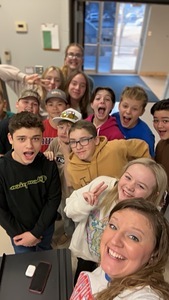40006402
Chapter 5 Test
Description
No tags specified
Flashcards by Maylie Letterman, updated 28 days ago
More
Less

|
Created by Maylie Letterman
about 1 month ago
|
|
Resource summary
| Question | Answer |
| The Proclamation of 1763 prohibited | colonist from settling west of the Appalachian Mountains. |
| The king and parliament viewed the American colonies as a | source of funds |
| which act did Britain pass to attempt to prevent smuggling | sugar act |
| what did the Stamp Act do | taxed almost all printed material in the colonies |
| leader of the Green Mountain Boys | Ethan allen |
| King George III's response to the Olive Branch petition | Refused to receive it |
| Crispus Attucks | Victim in Boston Massacure |
| Wrote the declaration of independence | Thomas Jefferson |
| who ran the first post office established by the Second Continental Congress | benjamin franklin |
| who wrote Common Sense | Thomas Pain |
| George Grenville convinced parliament to take action against | smugglers |
| writ of assistance | being able to search a colonist house |
| who persuaded the house of Burgesses to take action against the Stamp Act | Patrick henry |
| declaratory act | gave the British parliament the right to tax and make decisions for the colonies "in all cases whatsoever". |
| colonial leaders used the Boston massacre killings as | propaganda |
| "the shot heard round the world" refers to the actions of the minutemen at | Lexington and Concord |
| which colonists did not consider unfair taxes a good reason for rebellion | loyalists |
| Patriots | colonists who wanted to fight the British for American independence. |
| George Washington was chosen commander of the Continental Army upon the recommendation of | John Adams |
| The colonists expressed their desire for peace in the | olive branch petition |
| Great Britain issued the Proclamation of 1763 after the... war | french and Indian |
| As is repealed the stamp act, the British parliament asserted its right to tax the colonies with the ... act | declaratory |
| One result of the boston massacre was the repeal of the ... acts | townshed |
| the coercive acts were passed to punish colonists in Boston and other parts of Massachusetts for the | boston tea party |
| in response to unpopular laws and acts of the British king and parliament, the... met in Philadelphia in september 1774. | continental congress |
| the first battles of the American Revolution occurred in April 1775 in ... Massachusettes | Lexington and concord |
| in May 1775 american colonists led by Benedict Arnold and than fallen seized | fort ticonderoga |
| in the early years of the American Revolution... was a patriot but he eventually joined forces with the British | benedict |
| some colonists remained ... because they lived in relation isolation and had not been affected by the acts that turned many Americans against Britain | loyalist |
| King George rejected the ... in which the second continental congress made a last attempt to avoid war with Great Britain | olive branch petition |
| legal document permitting searches | writ of assistance |
| united protesters opposed to British rule | committees of correspondence |
| prevented supplies from being shipped to Boston | intolerable acts |
| shouted, "the regulars are out!" | paul revere |
| victim in boston massacre | Crispus Attucks |
| taxed printed material | stamp act |
| benefited from the Tea Act | British east India company |
| patriot leader | william prescott |
| made propaganda posters | Samuel Adams |
| preamble | introduction statement |
Want to create your own Flashcards for free with GoConqr? Learn more.
Similar
The Declaration of Independence, The Bill of Rights, and The Declaration of Sentiments.
Kellen Haynes
